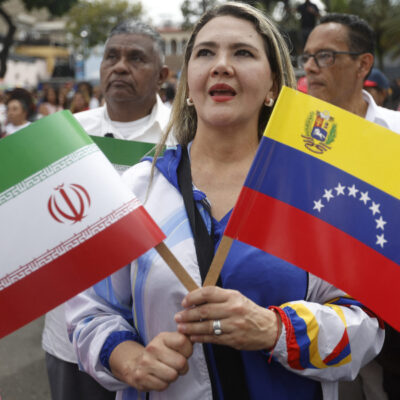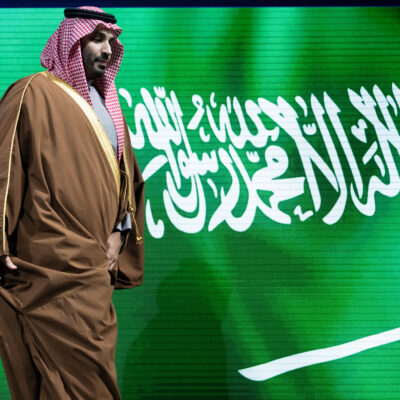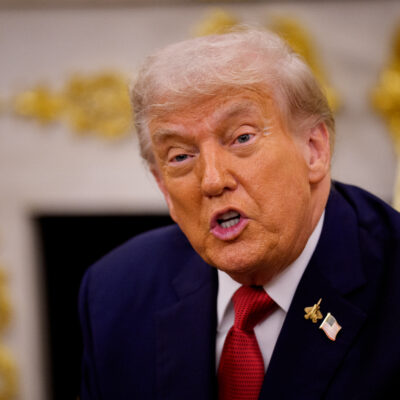
Bill Clark/CQ-Roll Call, Inc via Getty Images
Auchincloss: U.S. needs to focus on splitting Iran and China, not Saudi normalization with Israel
‘What I hope happens is that Trump focuses on wedging Iran from China, as opposed to being obsessed with getting Saudi Arabia into the Abraham Accords,’ the Massachusetts representative said
The incoming Trump administration needs to focus its Middle East policy on disrupting and distancing ties between Iran and China, rather than prioritizing normalization between Saudi Arabia and Israel, Rep. Jake Auchincloss (D-MA), a pro-Israel Democrat, told Jewish Insider in a lengthy interview last week on his proposal for Middle East policy in the coming years.
Auchincloss, who is Jewish, a military veteran and a member of the House Select Committee on the Chinese Communist Party, was also sharply critical of Saudi Arabia as an unreliable partner being led by a “clown.”
“What I hope happens is that Trump focuses on wedging Iran from China, as opposed to being obsessed with getting Saudi Arabia into the Abraham Accords,” Auchincloss said. “I’m not arguing that those two are necessarily mutually exclusive, but they require different trade-offs and there is prioritization. I think the most important thing we can do for the security of the Middle East is to continue to marginalize Iran’s hard-liners and to wedge it from the Chinese Communist Party.”
Saudi-Israel normalization has been a focus of the Biden administration’s Middle East foreign policy, and was seen as within reach prior to the Oct. 7 Hamas attack on Israel.
Saudi Arabia, Auchincloss argued, is still “animated by Wahhabi extremism” and, “in the long run … the Wahhabi strain of Islam is never going to be conducive with a strong alliance with Israel.”
He said that Saudi Arabia has “demonstrated over and over again that they are an extremist force.” And he offered particular scorn for Crown Prince Mohammed bin Salman, the leader whom a growing number of U.S. lawmakers have seen as a visionary reformer bringing the country into the 21st century.
Auchincloss, by contrast, sees bin Salman as a “clown” and “not a competent human being,” lambasting the kingdom’s massive construction projects like NEOM and The Line as “some dystopian vanity project in the middle of the desert” that’s “a complete indication of immaturity and vainglory” responsible for severe labor and environmental abuses.
He said that the massive sums spent on those construction projects would have been better used on quality-of-life improvements such as education, vaccinations or transit infrastructure. He also highlighted concerns about other human rights abuses including the killing of Washington Post columnist Jamal Khashoggi.
While some lawmakers say that bringing Saudi Arabia closer to the U.S. and Israel would help drive further modernization, Auchincloss said he doesn’t think bin Salman has shown the “visionary leadership” or “capacity” to follow through on that promise.
The Massachusetts congressman emphasized multiple times that he is not opposed to bringing Saudi Arabia into the Abraham Accords — and that he would very much like to see the kingdom join the developing regional air-defense infrastructure — but is not comfortable with the demands that Saudi Arabia has put forward, including security guarantees and nuclear enrichment.
“None of these things, to me, are worth it for a country that has not been a productive actor and I don’t think has any long-term compatibility with where we want this region to end up,” Auchincloss said.
Auchincloss insisted he doesn’t oppose “good relations” with Saudi Arabia and that the country “does a lot of things that are useful. It’s just, let’s not let the pursuit of Saudi Arabia joining the Abraham Accords induce us to give up things that are not in our interests, or to potentially not prioritize things that would be much more impactful.”
Some in Washington have argued that a deal between the U.S., Saudi Arabia and Israel is necessary to prevent Riyadh from drifting further into China’s camp. Auchincloss downplayed that possibility, given that Saudi elites “have a lot of orientation to” and financial interests in the West, which could be sanctioned if the country sided with China.
The congressman said that the U.S. should be focused on disrupting Iran’s entry into the Chinese-led “axis of authoritarianism” with Russia and North Korea.
“It has not hardened into this firm and fierce alliance, we can still wedge it,” Auchincloss said.
He said that the first key step to accomplishing that goal will be “aggressive enforcement” of the SHIP Act, which imposed new sanctions targeting Iran’s oil sales to China, and measures like it in order to crack down on the Iranian regime’s funding sources.
The second step, Auchincloss continued, will be to engage in direct negotiations with Beijing. He said he thinks that Iranian oil purchases is a “potential near-term [win]” that China might be willing to bend on, given that Iranian oil makes up no more than 20% of its energy usage.
“They don’t actually need Iranian oil,” Auchincloss said. “They’re doing it as a way to support the junior partner in this axis. It’s all negotiable. I’m not saying it’s an easy negotiation, but it could be on the table for negotiations.”
He described the issue as “central” to the U.S.-China bilateral relationship, given how Chinese money is funding Iran’s destabilizing activities across the Middle East. He said that, if the Trump administration uses its proposed tariffs on Chinese goods as a negotiating tool, the Iranian oil issue should be “top of the list” when the U.S. and China come to the table.
Auchincloss said the U.S. should also allow, or signal that it would allow, Israeli strikes on Iranian oil facilities, something the Biden administration intervened to stop earlier this year. Auchincloss said, though, that he thought the administration was right to tell Israel not to strike Iran’s oil terminals in the latest round of strikes.
He argued that by taking out Iran’s air defense in October, Israel created more options for future strikes, showed Iran that it can strike its oil infrastructure and avoided further retaliation by Iran or Hezbollah.
And he said the U.S. should be more proactive in helping Iranian civil society connect to the internet, as well as prepare a plan to empower Iranian civil society after the death of Supreme Leader Ayatollah Ali Khamenei, which Auchincloss predicted would come within the decade.
“Ultimately, the Iranian civil society, I think, is a moderate, stabilizing force in the Middle East,” Auchincloss said. “Traditionally it always has been — Persian civil society. And in the long run, we’re more likely to see alignment between Persian civil society in Israel than, I think, Wahhabi Arab civil society and Israel. Just to be clear: not the regime, but Persian civil society trampled upon by the regime.”
Ultimately, he continued, the U.S. should be trying to empower those in Iran “who would work for the Iranian national interest … we’re asking for Iran to not actively undermine its own national interest in pursuit of a antisemitic agenda that really does nothing for its own people.”
And he said that the U.S. cannot “countenance the imminent development of a nuclear weapon by Iran.”
Told by JI that Elon Musk had reportedly met with the Iranian ambassador to the United Nations — news that broke minutes before JI’s interview and has since been denied by Iran — on behalf of the Trump team, Auchincloss put his hand to his face.
“I don’t even know what to make of that. That is not appropriate,” Auchincloss said. “I don’t want to read into it because I don’t know the context. The entanglements of Elon Musk’s business interests and his support for Trump have become so enmeshed that it’s hard to even figure out … what are the interests that he’s advancing in that conversation? His own? Trump’s?”
In the shorter term, Auchincloss said the U.S. needs to continue trying to facilitate the “narrow” path toward peace in Gaza, which he said must involve a Western-backed, Arab-financed transitional authority led by Palestinians but — in a break from the Biden administration — not the Palestinian Authority.
He argued that a deal in which the Fatah-led PA was set to take over from Hamas would be “probably a bridge too far” for the remaining Hamas leadership. A technocratic “transitional authority” would provide “some ambiguity.” And he said he’s “not ready to say” that the U.S. should back the PA coming in to govern Gaza at a later date.
Auchincloss also said that the U.S. and its partners can’t afford to declare that “nobody who ever took a paycheck broadly from Hamas can ever work” in the transitional authority, as long as those individuals didn’t engage in terrorist activities.
He said that ruling out such individuals would risk repeating the mistakes of de-Ba’athification in Iraq, which he said ultimately “undermined the operation.”
Looking toward the incoming Trump administration, Auchincloss, a military veteran, said he was particularly concerned by the selection of former Hawaii Rep. Tulsi Gabbard as director of national intelligence.
He called Gabbard an “apologist for [Syrian President] Bashar Al Assad” and said it’s “deeply concerning” that she could be in charge of U.S. intelligence and the intelligence that makes it to President-elect Donald Trump.
“She has a clear set of presumptions and biases that are contrary to American interests,” Auchincloss said. “So it’s dangerous, and I think if the Senate confirms her, or they confirm Matt Gaetz [for attorney general], it’s going to be their first Article I failure of the second Trump administration,” he continued, referring to the Senate’s advise and consent role in confirming Cabinet picks.
He described Fox News host Pete Hegseth, Trump’s nominee to be secretary of defense, as a “yes man” whose selection “makes clear that the White House will be running the Department of Defense.” He said it will be critical for Congress to focus on “preventing the politicization of the General Staff.”
Auchincloss said he disagreed on policy issues like Ukraine with some of the more conventional nominees such as Sen. Marco Rubio (R-FL) as secretary of state and Rep. Mike Waltz (R-FL) as national security advisor, “but they’re qualified for the roles that they’re in, and I think in general, they can be expected to act credibly on the world stage.”






